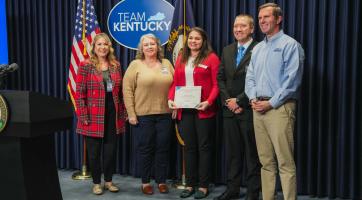Report Finds Legal Aid Organizations Hard Hit By Opioid Epidemic; Recommends Expanded Partnerships
July 9, 2019
While the criminal justice side of the opioid epidemic has received significant attention, the civil legal issues it has caused have quietly smoldered into a raging inferno, overwhelming legal aid providers, families, social service providers, and courts. The Legal Services Corporation, which funds legal aid organizations across America, recently rolled out a new report on this issue at the Tennessee Supreme Court in Nashville.
The Legal Services Corporation’s Opioid Task Force was formed in April 2018. Composed of not just civil legal aid attorneys, but public health professionals, business leaders, judges, and other experts, including Deborah Taylor Tate, the director of the Tennessee Administrative Office of the Courts, the Task Force set out to discover how legal aid organizations could best work with other groups to give people a better chance of overcoming the scourge of opioid use disorder.
“It was creating remarkable problems for our grantees,” LSC Board Member Victor B. Maddox said, referring to the dozens of civil legal aid offices dispersed throughout the nation that receive funding from the LSC. “This public health crisis has created and continues to create a civil legal aid crisis for survivors and communities related to issues such as child support, custody, health benefits, domestic violence, elder and child abuse, housing, employment, and others.”
The event at the Tennessee Supreme Court brought together a host of different leaders from the legal, public policy, and medical worlds to discuss the report’s findings and recommendations in the context of their own organizations’ efforts to confront the opioid epidemic.
“Among its many important findings, the report recognizes that civil legal aid providers are in a unique position to address the legal issues facing low income people with opioid use disorder, especially when those providers partner with healthcare providers and other entities, such as youth organizations, social services organizations, faith based organizations, schools, local law enforcement, state agencies, family justice centers, and local care recovery groups,” Maddox said. “Only by rallying and coordinating efforts from many sectors of our society will we be successful in turning back the relentless and remorseless scourge that is the opioid crisis.”
This is a message that was well-received by many of Tennessee’s leaders.
At the event, Tennessee Supreme Court Justice Jeff Bivins noted the particular acuity of the opioid epidemic in Tennessee—where 1,269 died from opioid overdoses in 2017—and welcomed the spotlight on ways that the civil legal aid community could help.

